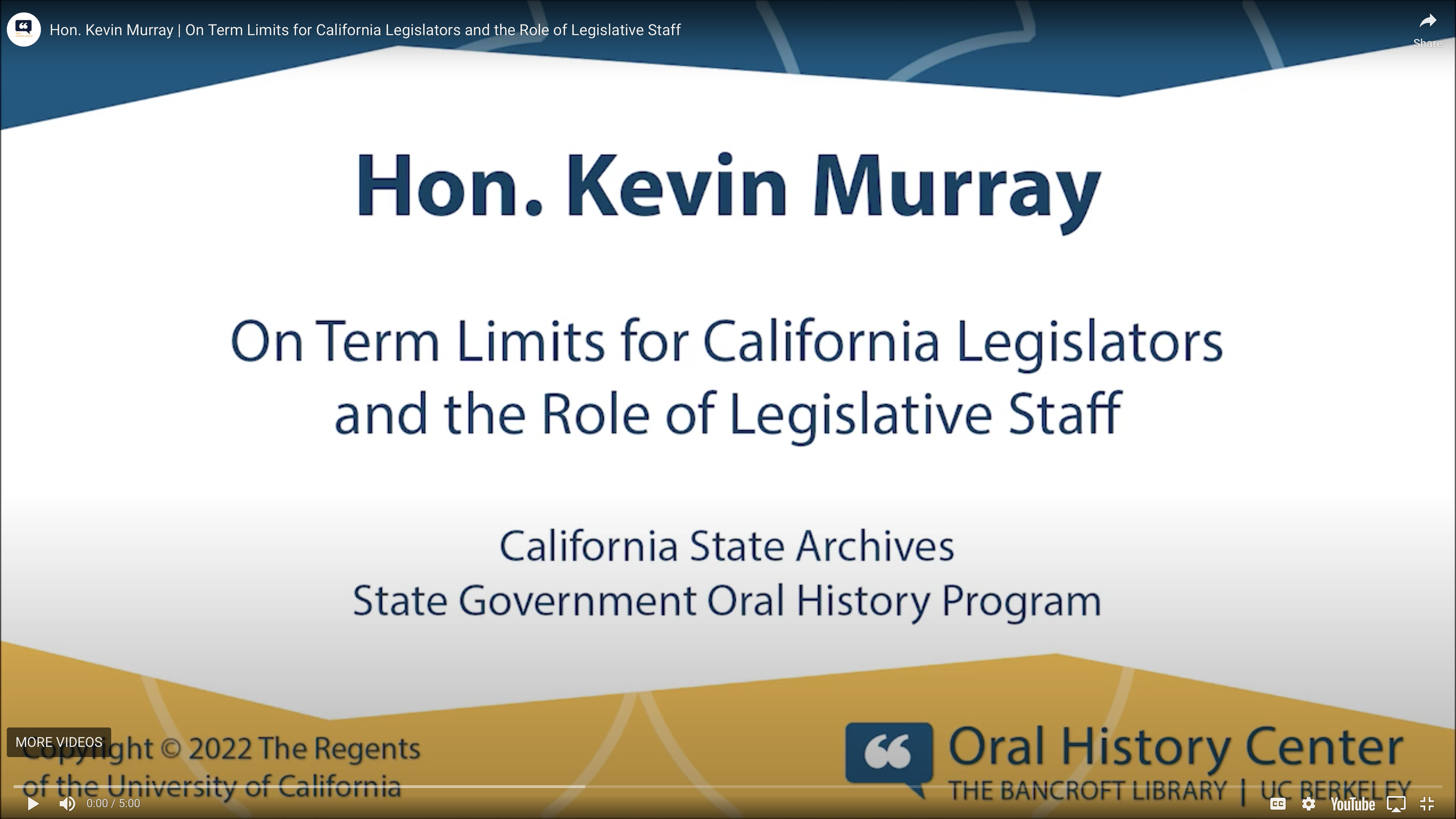Sen. Kevin Murray, an Oral History Release
The following content was originally released on April 14, 2023, by Roger Eardley-Pryor, Berkeley Library, University of California in collaboration with the California State Government Oral History Program.
Hon. Kevin Murray (ret.) in the early 2000s as a member of the California Senate
Hon. Kevin Murray: California State Assembly (1994-1998) and California State Senate (1998-2006)
Kevin Murray represented regions of Los Angeles as a member of the Democratic party in the California State Assembly (1994-1998) and in the California State Senate (1998-2006), until he retired due to term limits. Murray and [Roger Eardley-Pryor of Berkley University] recorded over five hours of interviews about his life and career in May 2021 as part of the Oral History Center‘s contributions to the California State Government Oral History Program. Murray’s oral history reveals ways he capitalized on opportunities as they arose throughout his life. In the process, he became an influential leader in the California Legislature, including as chair of the state’s Democratic Caucus and the California Legislative Black Caucus.
Political role models and becoming “more a legislator than a politician”
Murray described himself as more of a legislator than a politician. In the Assembly, Murray worked with Speaker Willie Brown and quickly became a leader who, over the next twelve years, served in both the California Assembly and Senate. Murray was elected as a Democratic member of the California State Assembly from the 47th District in Los Angeles from 1994-1998, where served as Chair of the Transportation Committee. In the California State Senate from 1998 to 2006, Murray represented the 26th District based in Culver City, California, and served as chair of the influential Appropriations Committee, the Transportation Committee, the Democratic Caucus, and the California Legislative Black Caucus. Murray also served on the California Film Commission.
Most of Murray’s oral history explored his years of political work in Sacramento where he passed numerous bills, including one of the nation’s first laws on identity theft (AB 157, the Consumer Protection: Identity Theft Act); bills on “Driving while Black”; education bills to address the digital divide and ensure California students had access to the internet (then called “the information superhighway”); bills protecting victims of domestic violence; a bill protecting houses of worship from hate crimes; and many others, including a bill eventually vetoed by Governor Pete Wilson that would have enabled Californians to register to vote online, to sign a petition online, and to vote via the internet as early as 1997.
California North-South power politics
Intra-caucus relationships in the California Legislature
California Senate and Assembly differences and good committees
On term limits for California Legislators and the role of legislative staff
While Murray’s oral history details his legislative efforts, he also reflected broadly on a variety of topics, including key differences between the California Assembly and Senate; on influential committee assignments; on intra-caucus relationships between the Black Caucus, Latino Caucus, API Caucus, and the Women’s Caucus; on North-South power politics in California; on his distaste for term limits and the importance of legislative staff; and on his political role models. Murray concluded his oral history with brief a discussion of his post-legislative life in Los Angeles with his wife and their two children, including reflections on the 2008 election of Barack Obama and the Black Lives Matter marches of 2020.
About the California State Government Oral History Program
Kevin Murray’s oral history was conducted in collaboration with the California State Government Oral History Program, which was created in 1985 with the passage of AB 2105. Charged with preserving the state’s executive and legislative history, this state Program conducts oral history interviews with individuals who played significant roles in California state government, including members of the legislature and constitutional officers, agency and department heads, and others involved in shaping public policy. The State Archives oversees and directs the Program’s operation, with interviewees selected by an advisory council and the interviews conducted by university-based oral history programs. Over the decades, this collective effort has resulted in hundreds of oral history interviews that document the history of the state’s executive and legislative branches, and enhance our understanding of public policy in California. The recordings and finished transcripts of these interviews are housed at the State Archives. Additionally, Kevin Murray’s oral history is available online in the Berkeley Library Digital Collections.
Written transcription located here.





